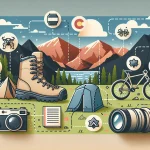Colorado is a popular destination for those looking to relocate. It offers stunning natural landscapes, vibrant cities, and an abundance of outdoor recreation. With 300 days of annual sunshine, a booming job market across sectors like tech and healthcare, an excellent education system, and a lower cost of living compared to coastal states, it’s no wonder many are drawn to make Colorado their new home.
In This Article
However, the logistics of long-distance moving can be daunting. To ensure your relocation goes smoothly, use this comprehensive moving guide, which covers everything you need to know about moving to and settling in the Centennial State.
TL;DR
- Research the different cities and regions to find the best fit based on preferences like climate, home prices, and amenities.
- Leverage online tools and local connections to search for housing and employment ahead of your move.
- Hire reputable Colorado moving companies to handle the packing, transport, and storage of your belongings.
- Upon arrival, immediately obtain a new driver's license, register vehicles, and forward mail.
- Connect with transplants through networking events and community groups to build your social circle.
Choosing Your Colorado Destination
With cities ranging from bustling Denver to the remote mountain towns of the Western Slope, selecting where to live is an important first step. Consider factors like:
Climate
The diverse topography creates variance in weather across Colorado. Places like Grand Junction see hot, dry summers and mild winters, while mountain locales contend with extreme winter snow.
Cost of Living
Prices fluctuate greatly depending on if you opt for an urban hub like Denver or a smaller community. Generally, housing is cheaper when moving further from the Front Range.
Employment Prospects
Job opportunities concentrate around Denver, Boulder, Fort Collins, and Colorado Springs, but niche industries thrive statewide.
Housing Market
Metro Denver maintains competitive home prices, while rural areas offer affordability. Rental vacancies sit around 5%, so start your search early.
Schools
Colorado consistently ranks among the top states for education. Douglas County, south of Denver, is often named the nation’s best school district.
Amenities
Urban areas provide all expected conveniences and entertainment, while small mountain towns deliver a quieter lifestyle focused on outdoor access.
Define your must-have location features, then research cities and neighborhoods to discover the optimal community meeting your standards. Reach out to residents to gain localized insights as well.
Preparing For Your Relocation
Give yourself plenty of time – 60-90 days minimum – to handle key tasks well in advance:
Housing
- Search rental listings or real estate agents to understand pricing and availability in your target locations. Competition moves quickly, so be ready to apply or make offers right away.
- If buying, get pre-approved for a mortgage and connect with lenders to understand market conditions.
- Schedule virtual tours to evaluate options without needing to visit yet. Video chat open houses became popular during COVID-19 and remain a useful preliminary step.
Employment
- Update your resume and LinkedIn profile to be recruiter-ready. Customize materials to align with Colorado opportunities by researching target companies and in-demand skills.
- Set up job alerts to get notified of new openings daily. Enable location filters to focus on Colorado postings.
- Leverage your network and local connections to uncover roles not publicly listed yet. Reach out for informational interviews.
- If relocating without a job secured, budget ample savings to cover 3-6 months of living expenses.
Relocation Logistics
- Obtain quotes from multiple residential moving companies specializing in Colorado. Be wary of brokers acting as middlemen – they tack on fees.
- If shipping vehicles, research registration requirements like emissions testing and VIN verification are needed in Colorado.
- Set a budget accounting for application fees, utility deposits, buying/renting moving equipment, and hidden costs. Unexpected expenses pop up.
Packing And Moving Your Belongings
Leave the heavy lifting to professionals by hiring one of Colorado’s many moving companies. Seek referrals from new local connections. Key factors when selecting a moving company include:
Services Offered
A full-service mover handles the entire process, from packing to transport and unpacking. Other companies only load the moving truck, so confirm what’s included.
Licensing and Insurance
Verify all companies are properly licensed and insured before signing any contracts. This protects you if belongings are damaged or lost.
Experience
Ask about previous Colorado moves and familiarity with your origin/destination cities. This expertise helps you avoid potential hazards.
Reviews and Testimonials
Past customer feedback reveals red flags and reliable options. Check third-party review sites and company websites to find the best moving companies.
Cost
Obtain binding estimates from multiple moving companies outlining all fees and moving services clearly. Beware of extremely low bids that seem too good to be true.
When possible, make an initial trip for housing/job interviews and schedule movers to transport your belongings shortly after. This prevents paying storage fees while getting settled.
Alternatively, movers can deliver items straight to your new home if you secure housing ahead of time. Some even provide short-term storage options as needed.
Settling Into Your New Colorado Life
Upon arriving, promptly complete key tasks like:
Obtain a New License and Registration
- Apply for a new driver's license within 90 days at your local DMV. Bring required documents, such as proof of identity and residency.
- Title and register vehicles in Colorado within 90 days, too. This establishes legal ownership under your name.
Forward Mail
- Submit a Change of Address form to forward mail to your new Colorado residence and notify contacts.
- Update accounts with new address details to prevent missed bills and important notices.
Meet Neighbors
- Introduce yourself to neighbors right away. Getting to know locals helps understand community norms and events.
- Walk around the area to locate conveniences like parks, restaurants, grocery stores, and more. Familiarize yourself with what's nearby.
Explore the Outdoors
- Immerse yourself in outdoor activities in Colorado's natural playground. Look for beginner-friendly hikes as you acclimate to the altitude.
- Check municipal sites listing free summer concerts, festivals, and other community happenings.
Find Community
- Attend meetups like Newcomers Clubs for your city to connect with fellow new Colorado residents.
- Seek groups aligned with your interests, like sports leagues, volunteer organizations, and hobby-based clubs.
- Follow local subreddits, blogs, and social media influencers who cover news and events in your city.
The relocation process can feel overwhelming, but thorough preparation and connecting with resourceful locals will ensure your move goes smoothly. Soon, you’ll be proudly calling Colorado home.
FAQ
The following FAQs provide Colorado moving tips and other information for a smooth moving day.
How much does it cost to live in Colorado?
Colorado maintains a lower-than-average cost of living compared to coastal states, with expenses varying greatly across cities. Overall, housing eats up the largest portion of budgets. Rent for a one-bedroom apartment averages $1,500 per month, while the median home price sits around $550,000 along the Front Range.
What is the job market like in Colorado?
Several high-growth industries fuel Colorado’s strong economy and abundance of opportunities. Leading sectors include technology, healthcare, bioscience, renewable energy, tourism/hospitality, construction and aerospace. Major employers are centered in Denver, but jobs exist statewide.
What are the best school districts in Colorado?
Colorado consistently ranks among the top US states in terms of education. The Douglas County School District south of Denver most often claims the #1 spot nationwide, while Cherry Creek, Littleton, and Boulder Valley also earn high marks.
How long does it take to drive across Colorado?
At its widest point, Colorado is 380 miles across. Driving nonstop between border cities like Grand Junction and Burlington takes about 6 hours, covering mountain roads and High Plains terrain. Add extra time for stops to admire the diverse scenery.
What are the dangerous areas in Colorado?
Colorado maintains relatively low crime rates, with violent offenses rare statewide. However, neighborhoods to avoid primarily concentrate in the Denver metro, including Montbello, Five Points, and certain parts of Aurora. Violent crime also occurs more often in Pueblo.






